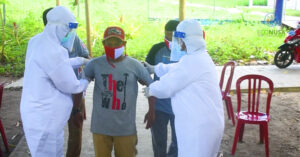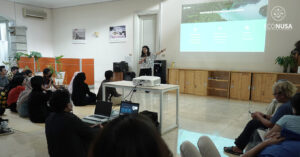
The future of the nation is in the hands of young people today. Likewise with the sustainability of Indonesia’s sea. For this reason, proper education is needed so that Indonesian Youth have the interest and concern for the sector that will become the fundamental of the Indonesian Maritime State.
Indonesia is predicted to get a demographic bonus in 2020-2030. The demographic bonus is the total age of the labor force with ages 15-64 reaching 70 percent. While 30 percent of the population is unproductive age that is aged 14 years and under and above 65 years. For this reason, fertilization of sea love must also be carried out parallel while preparing the demographic bonus.
The Nusantara Sea Scout Movement as a forum for parties who have concern for the sea this time visited the University of Indonesia in the Sea Harmony Discussion with students with the theme “Creative Keep the Sea”, also present as the main resource persons, the Special Staff Coordinator of the Task Force on the Illegal Fishing Eradication of the Ministry of Maritime Affairs and Fisheries; Achmad Santosa, Director General of Marine Management of the KKP; Brahmantya Satyamurti, Lecturer in Environmental Philosophy UI; Saraswati Putri, Chairperson of Pandu Laut Daily; Prita Laura and Chair of the EcoNusa Foundation; Bustar Maitar.
Marine management cannot be carried out by the Government alone, therefore it requires the participation of many parties. Unfortunately, the culture for sea love has not been embedded in society since childhood.
According to Brahmantya, that condition can be seen from the rarity of people visiting the sea. “Even though the sea is our future, then the culture of sea love should be planted from now on,” explained Brahmantya in the Discussion.
He also highlighted the change in environmentally friendly culture that occurred with the discovery of plastic as a cheap material that can be used as food and drinks. “This is tragic, why do we change our culture for things that are not sustainable,” he said.
A concrete safeguard in protecting the sea is to prevent waste from running into the sea. Plastic waste in Indonesia reaches 64 million tons / year of which 3.2 million tons is plastic waste (source; BPS & INAPLAS). Whereas 10 billion pieces of plastic bags thrown into the environment per year = 85,000 tons of plastic bags (source; BPS & INAPLAS). 32% of plastic waste pollutes the environment. (source of the World Economic Forum 2016). Plastic waste that enters the sea can be split into small particles called microplastics with a size of 0.3 – 5 millimeters. Microplastics are very easily consumed by marine animals.
Achmad Santosa on the occasion said that sea protection and protection cannot be done alone by the government. The government needs a lot of help from all walks of life, especially for the high seas, outside the exclusive economic zone that is the center of crime.
“Movements to respect the sea by this community must be reproduced, because we need the sea. But not necessarily the sea needs us, so now not only human rights, but also ocean rights have developed in various countries, “he explained.
Lecturer at the Faculty of Philosophy UI Saras Dewi stated that Indonesian culture was formed from the sea. Therefore, actually the closeness of the community with the sea has been attached long ago.
“People in ancient times not only saw the sea as physical, but there were aspects of spirituality there, there was emotional closeness, so it was not surprising when there were rituals and worship to the sea,” he explained.
Meanwhile, Prita Laura sees that the sea issue has grown since the administration of President Joko Widodo and Minister Susi Pudjiastuti. For this reason, efforts are needed to maintain momentum. “There is anxiety in us, who are concerned about the environment of what will happen to the sea after the next government, where our ocean will go while the rate of sea damage is very fast. That’s why the sea guide of the archipelago is here to accommodate the concerns that are owned by people, “he explained.
In the discussion also launched a scholarship program for all students throughout Indonesia. The program titled EcoNusa Student Ocean Challenge (EcoSOC2018) invites students to develop ideas for activities in the form of discussion forums, campaigns or other innovations around environmental issues specifically about returning “Marine Harmony as the Future of the Nation” which was also chosen as the theme of the activity.
Students are sufficient to submit proposals for their activities with a deadline for collection on 30 September 2018 via the link bit.ly/EcoSOC18. Later all proposals will be selected and announced the winner on October 10, 2018. The amount of funding for the selected activity ideas is IDR 5 million each for 5 winners.
“Here the sea challenges students, so we wait for your creative ideas,” said Bustar Maitar giving an announcement.




